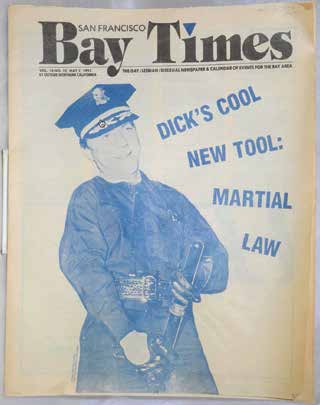 By John Lewis and Stuart Gaffney–
By John Lewis and Stuart Gaffney–
It was early May, 1992, and San Francisco was among several cities in the nation where street protests erupted in response to the Rodney King verdicts in Los Angeles. San Francisco Police Chief Richard Hongisto cracked down hard on protestors, even sealing off a portion of the Mission during a protest and arresting hundreds of innocent protestors and bystanders alike. The people arrested were jailed for up to 30 hours and not in San Francisco, but in the eastern reaches of Alameda County so that they could not get released and return to protest.
Numerous San Franciscans, including many in the LGBTIQ community, were outraged. Indeed, an LGBTIQ member of conservative Mayor Frank Jordan’s own staff had been arrested in the sweep.
The San Francisco Bay Times expressed its reaction and that of the community to Hongisto’s unlawful, authoritarian actions in a colorful cover page and lead article. Adorning the cover was Hongisto’s grinning face, imposed on the body of what appeared to be a police officer holding a baton emerging upward from the groin area—with his hand positioned on the baton, clearly implying the reason for the police chief’s grin. The all caps headline boldly proclaimed: “Dick’s Cool New Tool: Martial Law.” The article inside detailed how Hongisto’s actions constituted a “wholesale suspension of the First Amendment, but also a total abrogation of much of the Constitution.”
We remember seeing the eye-catching cover on the newsracks immediately upon publication and were impressed by the Bay Times’ fearless journalistic response to what Hongisto had done—both in terms of the paper’s creative imagery and written content of the article.
But Hongisto was not amused, to say the least. He was outraged, and he did something extraordinary. He directed several of his force in the wee hours of the night to remove the papers from newsstands across the city. In all, approximately 2,000–3,000 copies of the paper were confiscated and later found in a police officer’s garage.
What Hongisto had engineered soon came to light, and the Bay Times fought back. The Police Commission fired Hongisto within days, and the Bay Times sued, winning an historic verdict.

To be free from arbitrary arrest and to be free to express oneself lie at the heart of a free society. The Bay Times stood up for these time-honored values in a dramatic way 26 years ago when it spoke up for the constitutional rights of the protesters and bystanders not to be jailed and then for its own freedom of expression. This is what the Bay Times has been doing for our community in less dramatic ways, week in and week out for four decades.
The cherished principles of freedom from arrest and freedom of expression have been essential values to the modern LGBTIQ rights movement and the community from their beginning. For many decades, LGBTIQ people faced the fear of being harassed or arrested. It was only 15 years ago that the U.S. Supreme Court declared that LGBTIQ people could not be arrested and jailed for the physical expression of intimate love for one another. Our community’s winning the right not to be branded criminals because of who we love—something we should never have had to fight for in the first place—has been the gateway to many of the substantial advances for LGBTIQ civil rights that we have achieved more recently.
Our courage to express ourselves truthfully in the face of personal, familial and society obstacles is why we have the vibrant movement and community we have today. The expression of our lives through our talents, passions and commitment to our human dignity and each other has enabled our community to flower in all of its beautiful diversity.
The Bay Times and the LGBTIQ press tell our community’s stories and creativity that the mainstream media may misrepresent or neglect. It’s a place where we can receive accurate news without the distortion of the mainstream’s “he said, she said” journalism that can ignore facts and promote false equivalency.
Today, while it seems unlikely that thousands of copies of the Bay Times will be seized by the police as they were 26 years ago, journalism faces an even more invidious threat as the President of the United States attacks any news reporting he dislikes as “fake” news. The Bay Times is a community treasure, and its role is more vital to our community than ever.
Stuart Gaffney and John Lewis, together for over three decades, were plaintiffs in the California case for equal marriage rights decided by the California Supreme Court in 2008. Their leadership in the grassroots organization Marriage Equality USA contributed in 2015 to making same-sex marriage legal nationwide.
Recent Comments